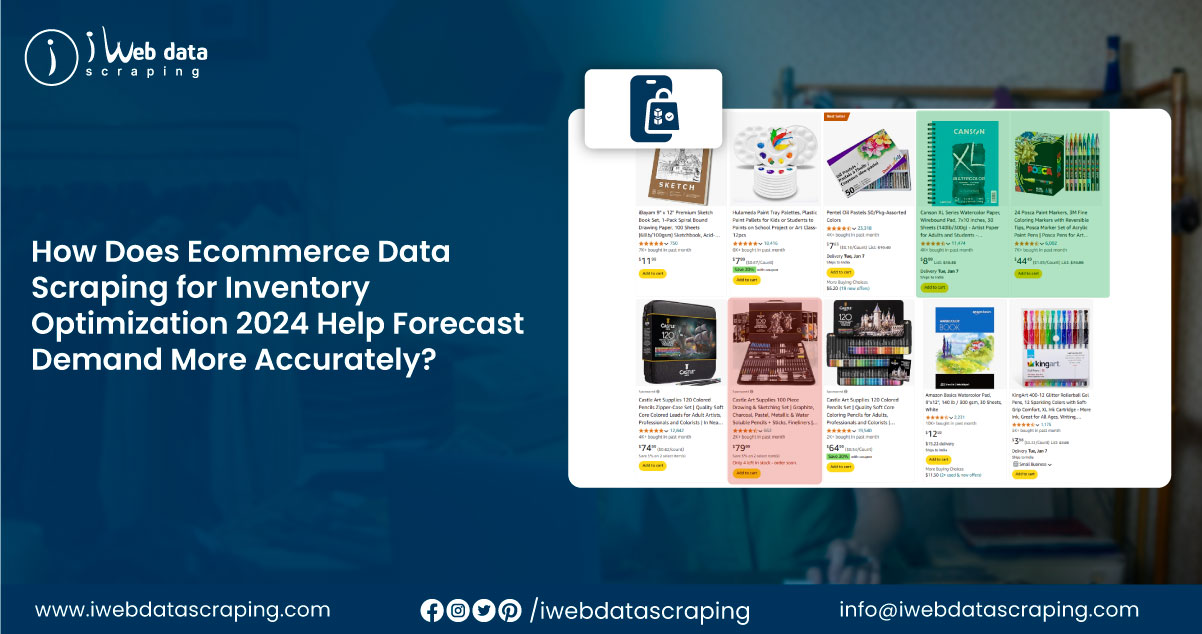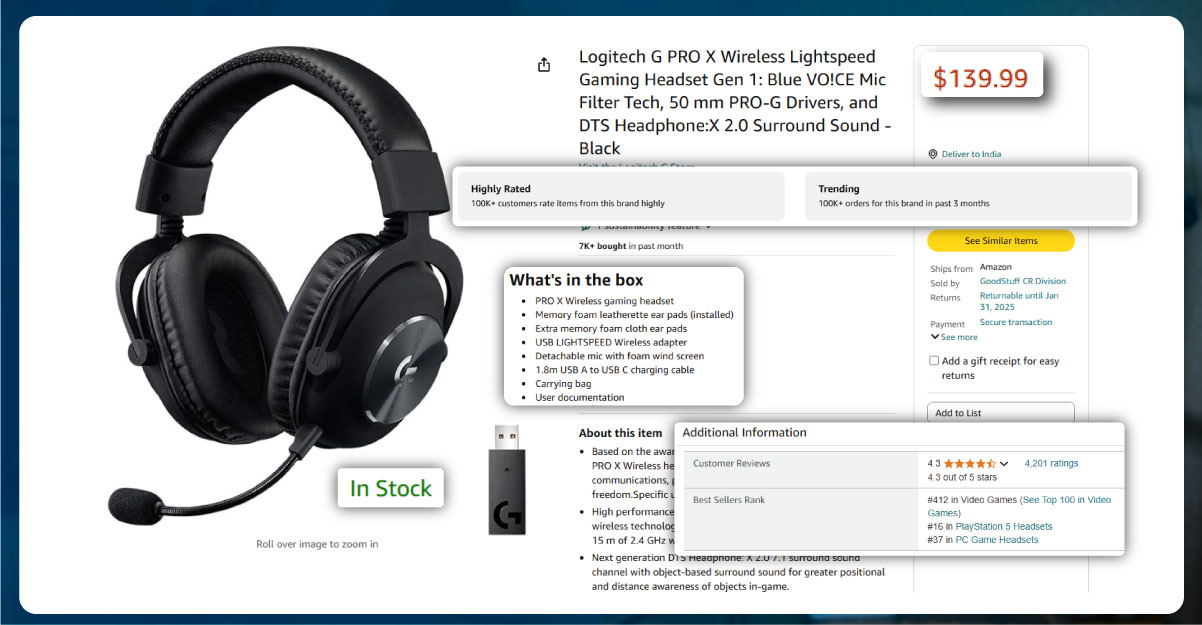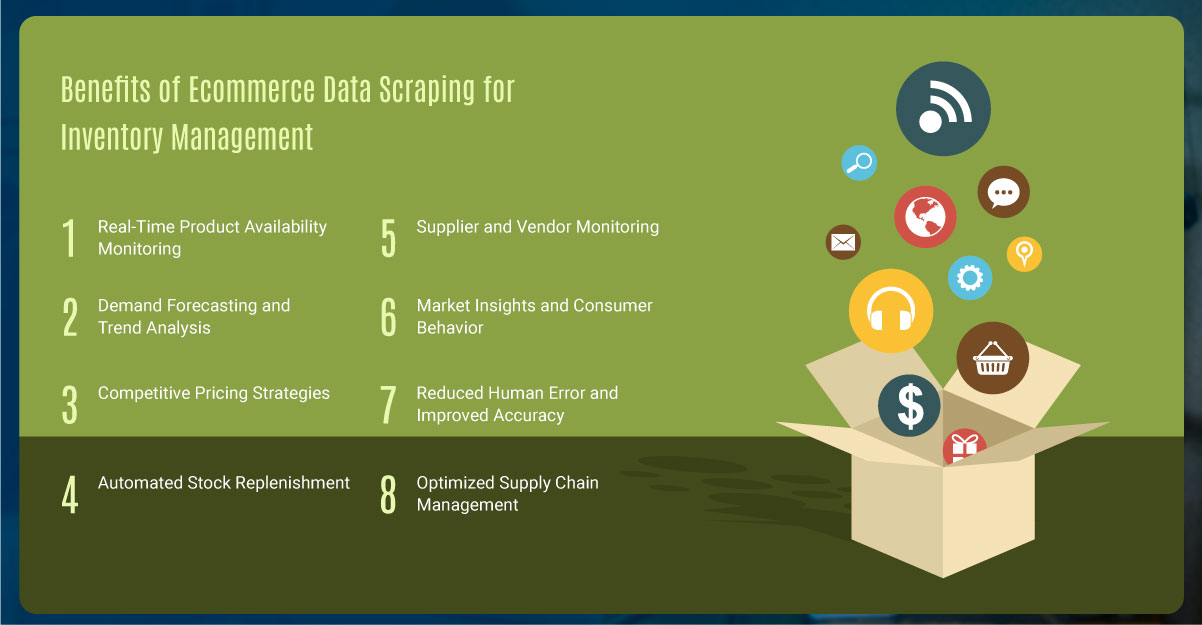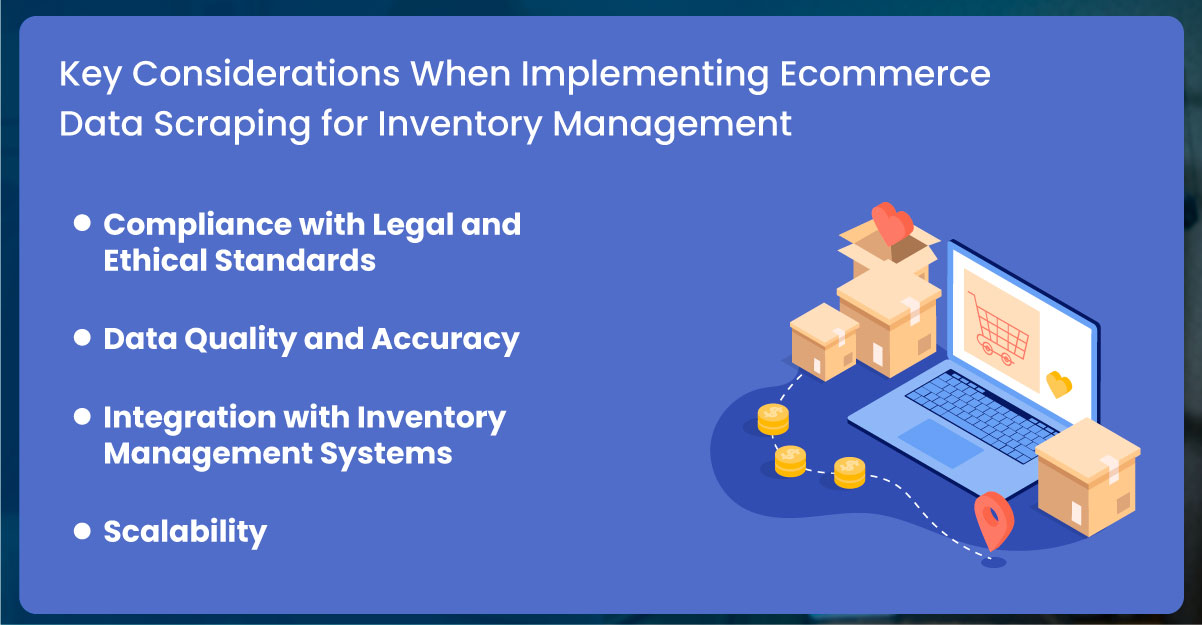

Managing inventory efficiently has become one of the most crucial aspects of running a successful ecommerce business as the digital marketplace expands. In 2024, with new technologies and methods, inventory management has evolved from traditional systems into more sophisticated and automated solutions. One of the most potent tools for ecommerce businesses is Ecommerce Data Scraping for Inventory Optimization 2024. Data scraping, the process of extracting large amounts of data from websites, has become an indispensable tool for gathering real-time information that can significantly improve inventory management processes. By utilizing Web Scraping Ecommerce Inventory Data, businesses can access crucial information about product availability, competitor pricing, and market trends, enabling them to make informed decisions. This blog explores how Ecommerce Data Scraping Services are revolutionizing inventory management and helping businesses improve their efficiency in 2024.

Effective inventory management is a cornerstone of any successful ecommerce business. It involves tracking real-time stock levels, orders, sales, and product deliveries. In the fast-paced world of online retail, businesses face challenges such as stock outs, overstocking, and inefficient restocking, all of which can lead to lost sales and customer dissatisfaction. Inaccurate inventory management can lead to missed opportunities, reduced customer satisfaction, and, ultimately, decreased revenue.
Traditionally, inventory management relied on manual processes, spreadsheets, and essential software solutions. However, as the complexity of ecommerce operations grows, businesses are increasingly turning to advanced technologies to handle large datasets, automate processes, and make data-driven decisions. One such technology is Web Scraping Ecommerce Data Inventory Management, which has proven essential in overcoming inventory management challenges. The 2024 Trends in Ecommerce Inventory Optimization are pointing toward a greater reliance on automated solutions, and ecommerce data scraping is at the forefront of this revolution.

Ecommerce data scraping refers to the automated process of extracting large quantities of data from ecommerce websites, such as product prices, availability, specifications, and other essential information. This data is then structured and analyzed to provide businesses with insights that can help optimize various operational aspects, including inventory management. By utilizing E-Commerce Products and Review Datasets , businesses can continuously monitor competitors, track product trends, and stay updated on real-time market conditions.

Ecommerce data scraping offers significant benefits for inventory management, providing real-time insights into stock levels, pricing, and market trends. By automating data extraction, businesses can optimize stock levels, reduce costs, and enhance decision-making, ultimately improving overall operational efficiency.
In an ever-changing ecommerce environment, businesses must track product availability in real time. Real-time E-Commerce Inventory Tracking allows businesses to monitor their suppliers, competitors, and other marketplaces for product availability and stock levels. This information is particularly useful in identifying supply chain disruptions or anticipating product shortages. By scraping data from multiple sources, businesses can ensure they are never caught off-guard by sudden inventory shortages, improving their ability to maintain product availability and reduce stock outs.
One of the most significant advantages of ecommerce data scraping is its ability to help businesses predict future demand. Businesses can gain insights into market trends and anticipate demand fluctuations by collecting data from competitors, suppliers, and customer feedback. Extract Ecommerce Data for Inventory Optimization 2024 allows for collecting historical data and real-time market activity, enabling businesses to forecast demand more accurately. With this insight, businesses can adjust inventory levels accordingly, preventing overstocking or understocking issues. For instance, if a particular product is seeing a surge in popularity across various platforms, scraping can help businesses identify this trend early and increase inventory levels before the demand peaks.
Pricing plays a critical role in inventory management. Businesses must continuously monitor competitors' pricing strategies to ensure their prices are competitive. Companies can easily track competitor prices, promotions, and discounts through ecommerce data scraping. This information helps businesses adjust their pricing strategies by aligning with competitors or differentiating themselves through value-added services. By using an Ecommerce Data Scraper to collect data from various sources, businesses can optimize price for individual products, ensuring they stay competitive in a fast-moving market while maximizing profitability.
If done manually, inventory replenishment can be time-consuming and error-prone. With data scraping, businesses can automate stock replenishment by monitoring inventory levels on multiple platforms and suppliers. The scraping tool can trigger alerts or automatic restocking requests when stock levels reach a predefined threshold. This not only saves time but also helps businesses maintain an optimal inventory level without constant manual intervention. Automating stock replenishment ensures that businesses have the right amount of stock at all times, preventing both stock outs and excess inventory.
Scraping supplier and vendor websites effectively allows ecommerce businesses to monitor product pricing, availability, and shipping conditions. This data allows companies to choose the most reliable suppliers and negotiate better terms. For instance, if a supplier offers favorable pricing or faster delivery times compared to others, scraping this information in real time enables businesses to make informed decisions quickly. By continuously monitoring suppliers' websites for updates, businesses can ensure they are always working with the most efficient vendors and adjust their supply chain management accordingly.
Scraping data from online marketplaces, customer reviews, and forums can provide valuable insights into consumer behavior and product preferences. This data can inform inventory management decisions by highlighting which products are in high demand, what features customers prefer, and where unmet market needs may be. Understanding customer sentiment is essential for stock optimization. For example, if a product consistently receives positive feedback, businesses can increase its stock levels, while items with poor reviews might be phased out. Monitoring this information can also help businesses stay ahead of market trends, ensuring they have the right products at the right time.
Manual inventory management processes are prone to errors. Data entry mistakes, missed updates, or incorrect stock counts can lead to significant operational inefficiencies. By automating inventory data collection through ecommerce data scraping, businesses can reduce the risk of human error and improve the accuracy of their inventory systems. Scraping ensures that inventory data is consistently updated and synchronized across platforms, making it easier for businesses to manage their stock levels, track sales, and predict future needs.
Effective supply chain management relies heavily on accurate, timely data. Ecommerce data scraping can provide businesses with a 360-degree view of their supply chain by gathering data from multiple sources, including suppliers, competitors, and industry reports. This comprehensive view allows businesses to identify potential supply chain disruptions, evaluate supplier performance, and improve logistics operations. With real-time data on stock availability, shipping times, and inventory trends, businesses can make more informed decisions, streamline their processes, and optimize their supply chain to reduce delays and costs.

While ecommerce data scraping can offer immense benefits for inventory management, businesses must consider a few factors before implementation:
Web scraping must be done in compliance with legal regulations and ethical standards. Some websites may have terms of service prohibiting scraping, so businesses must ensure they are not violating any laws or agreements when collecting data. Using scraping tools that respect these terms and do not overload websites' servers is essential to avoid legal and operational issues.
The quality and accuracy of scraped data are critical. Businesses should use advanced scraping tools to handle complex websites and ensure accurate data extraction. The data should also be validated and cleaned to avoid errors that could lead to incorrect inventory decisions.
To fully leverage the benefits of ecommerce data scraping, businesses need to integrate the scraped data with their existing inventory management systems. This seamless integration ensures that real-time data feeds directly into stock management, enabling businesses to make quick and informed decisions.
As ecommerce businesses grow, their data scraping needs may become more complex. Choosing a scalable scraping solution that can handle large volumes of data across multiple platforms and suppliers is crucial to ensuring the strategy's long-term effectiveness.
In 2024, ecommerce data scraping has become a game-changer for businesses looking to improve their inventory management processes. By enabling real-time tracking of product availability, demand forecasting, competitive pricing, and automated stock replenishment, data scraping helps businesses optimize their operations, reduce costs, and enhance customer satisfaction. As ecommerce continues to grow, businesses that embrace data scraping will gain a significant competitive advantage, ensuring they stay ahead in an increasingly complex marketplace.
Experience top-notch web scraping service and mobile app scraping solutions with iWeb Data Scraping. Our skilled team excels in extracting various data sets, including retail store locations and beyond. Connect with us today to learn how our customized services can address your unique project needs, delivering the highest efficiency and dependability for all your data requirements.